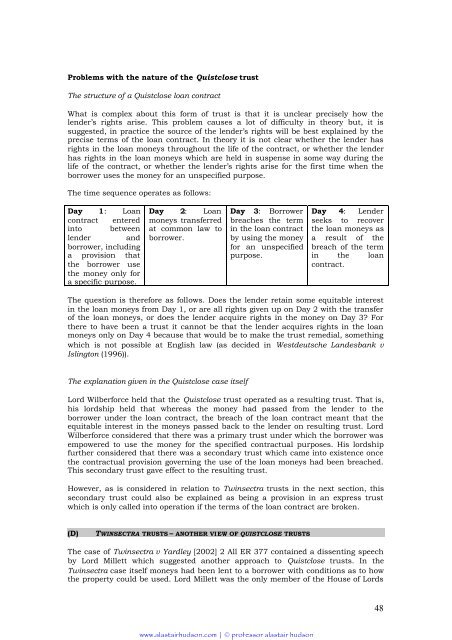Advanced Equity and Trusts Law - alastairhudson.com
Advanced Equity and Trusts Law - alastairhudson.com
Advanced Equity and Trusts Law - alastairhudson.com
You also want an ePaper? Increase the reach of your titles
YUMPU automatically turns print PDFs into web optimized ePapers that Google loves.
Problems with the nature of the Quistclose trust<br />
The structure of a Quistclose loan contract<br />
What is <strong>com</strong>plex about this form of trust is that it is unclear precisely how the<br />
lender’s rights arise. This problem causes a lot of difficulty in theory but, it is<br />
suggested, in practice the source of the lender’s rights will be best explained by the<br />
precise terms of the loan contract. In theory it is not clear whether the lender has<br />
rights in the loan moneys throughout the life of the contract, or whether the lender<br />
has rights in the loan moneys which are held in suspense in some way during the<br />
life of the contract, or whether the lender’s rights arise for the first time when the<br />
borrower uses the money for an unspecified purpose.<br />
The time sequence operates as follows:<br />
Day 1: Loan<br />
contract entered<br />
into between<br />
lender <strong>and</strong><br />
borrower, including<br />
a provision that<br />
the borrower use<br />
the money only for<br />
a specific purpose.<br />
Day 2: Loan<br />
moneys transferred<br />
at <strong>com</strong>mon law to<br />
borrower.<br />
Day 3: Borrower<br />
breaches the term<br />
in the loan contract<br />
by using the money<br />
for an unspecified<br />
purpose.<br />
Day 4: Lender<br />
seeks to recover<br />
the loan moneys as<br />
a result of the<br />
breach of the term<br />
in the loan<br />
contract.<br />
The question is therefore as follows. Does the lender retain some equitable interest<br />
in the loan moneys from Day 1, or are all rights given up on Day 2 with the transfer<br />
of the loan moneys, or does the lender acquire rights in the money on Day 3? For<br />
there to have been a trust it cannot be that the lender acquires rights in the loan<br />
moneys only on Day 4 because that would be to make the trust remedial, something<br />
which is not possible at English law (as decided in Westdeutsche L<strong>and</strong>esbank v<br />
Islington (1996)).<br />
The explanation given in the Quistclose case itself<br />
Lord Wilberforce held that the Quistclose trust operated as a resulting trust. That is,<br />
his lordship held that whereas the money had passed from the lender to the<br />
borrower under the loan contract, the breach of the loan contract meant that the<br />
equitable interest in the moneys passed back to the lender on resulting trust. Lord<br />
Wilberforce considered that there was a primary trust under which the borrower was<br />
empowered to use the money for the specified contractual purposes. His lordship<br />
further considered that there was a secondary trust which came into existence once<br />
the contractual provision governing the use of the loan moneys had been breached.<br />
This secondary trust gave effect to the resulting trust.<br />
However, as is considered in relation to Twinsectra trusts in the next section, this<br />
secondary trust could also be explained as being a provision in an express trust<br />
which is only called into operation if the terms of the loan contract are broken.<br />
(D) TWINSECTRA TRUSTS – ANOTHER VIEW OF QUISTCLOSE TRUSTS<br />
The case of Twinsectra v Yardley [2002] 2 All ER 377 contained a dissenting speech<br />
by Lord Millett which suggested another approach to Quistclose trusts. In the<br />
Twinsectra case itself moneys had been lent to a borrower with conditions as to how<br />
the property could be used. Lord Millett was the only member of the House of Lords<br />
www.<strong>alastairhudson</strong>.<strong>com</strong> | © professor alastair hudson<br />
48













